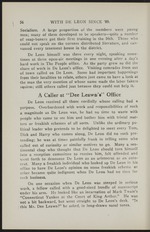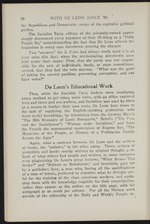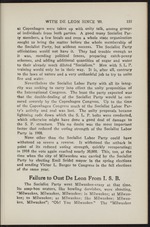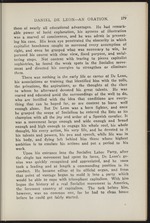| 1 |
 |
“...56 WITH DE LEON SINCE 89.
Socialism. A large proportion of the members were young
men; many of them developed to be speakersquite a number
of soap-boxers got their first training in the 16th. Those who
could not speak on the corners distributed literature, and can-
vassed every tenement house in the district.
De Leon himself was there every night, speaking some-
times at three open-air meetings in one evening after a days
hard work in The People office. As the party grew so did the
share of work in De Leons office. Visiting comrades from out
of town called on De Leon. Some had important happenings
from their localities to relate, others just came to have a look at
the man the very mention of whose name made the labor fakers
squirm; still others called just because they could not help it.
A Caller at Dee Lcawna Office
De Leon received all those cordially whose calling bad a
purpose. Overburdened with work and responsibilities of such
a magnitude as De Leon was, he had no time to waste with...”
|
|
| 2 |
 |
“...Again, what a contrast between De Leon and the writers
of books, the authors, in the other camp. There, writers of
pamphlets and books mostly without an original thought, a re-
hash of what others had taught and written, in some instances
even plagiarizing De Leons great lectures, What Means Tins
Strike? and Reform or Revolution, and invariably paid for
by a publisher; here, a man who, having all the qualifications
of a man of letters, preferred to translate what he thought use-
ful for the training of the class conscious workers, and equip-
ping them with the knowledge requisite for their emancipation,
rather than appear as the author on the title page, with his
autograph at so much per volume. For all the literary work
outside of the editorship of the Daily and Weekly People, in-^...”
|
|
| 3 |
 |
“...unity talk, among groups
of individuals from both parties. A good many Socialist Par-
ty members, a few locals and even a whole state organization
sought to bring the matter before the whole membership of
the Socialist Party, but without success. The Socialist Party
officialdom would not have it. They had trouble enough as
it was, mending political fences, preparing catch-penny
schemes, and adding additional quantities of sugar and water
to their already much diluted Socialism. Men with S. L. P.
training would only be in their way. It is, after all, contrary
to the laws of nature and a very unthankful job to try to unite
fire and water.
Nevertheless the Socialist Labor Party with all its integ-
rity was seeking to carry into effect the unity proposition of
the International Congress. The least the party expected was
that the double-dealing of the Socialist Party would be cen-
sured severely by the Copenhagen Congress. Up to the time
of the Copenhagen Congress much of the Socialist Labor Par-...”
|
|
| 4 |
 |
“...his case. His keen eye penetrated the obscurity in which
capitalist henchmen sought to surround every assumption of
right, and once he grasped what was necessary to win, he
pursued his course with clear view, fixed purpose, and unfal-
tering steps. Not content with tearing to pieces capitalist
sophistries, he found the weak spots in the Socialist^ move-
ment and directed his energies to strengthen or eliminate
them.
There was nothing in the early life or career of De Leon,
his associations or training that identified him with the toils,
the privations, the aspirations, or the thoughts of the class
to whom he afterward devoted his great talents. He was
reared and educated amid the surroundings of the well to do,
who are instilled with the idea that conditions are every-
thing that can be hoped for, or are content to leave well
enough alone. But De Leon was a born fighter, and once
he grasped the scope of Socialism he entered the lists as its
champion with all the joy and ardor of a Spanish...”
|
|
